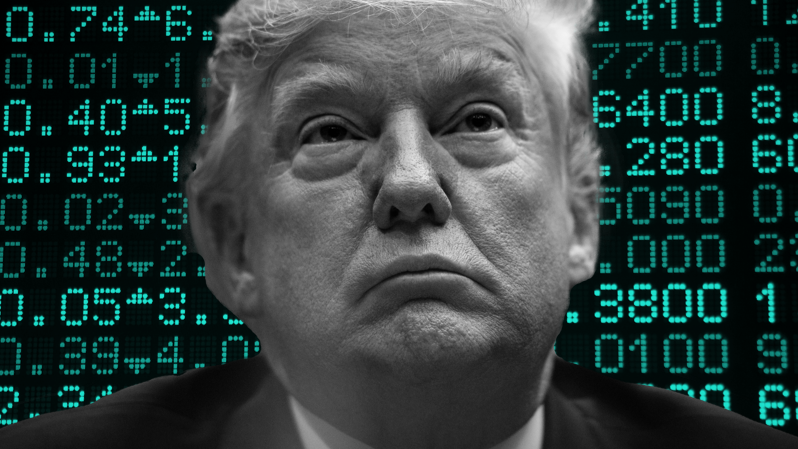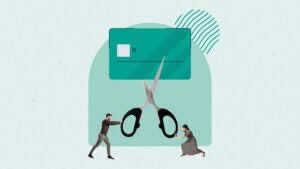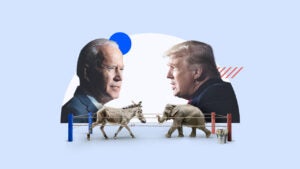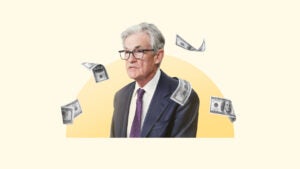Survey: Americans divided on whether to credit Trump with strong economy


President Donald Trump is only a little more likely than his predecessor to get credit for the ongoing economic expansion, according to a new Bankrate survey.
Almost a third (32 percent) of respondents in the nationally representative survey said Trump’s policies are responsible for the continued economic growth, as measured by the rise in gross domestic product, or GDP.
Twenty-seven percent of respondents told Bankrate that Trump’s predecessor, President Barack Obama, should get credit for the strength of the economy. Obama took office during the Great Recession and left the White House with an almost eight-year economic expansion. A fifth of people said the policies of both presidents were responsible for the current growth, while 17 percent assigned credit to neither president.
Many not seeing the economic gains
Trump claims to have created “the greatest economy in the history of our country.” GDP — the value of the goods and services produced in the United States — climbed 11.2 percent from first quarter 2017 to $21.3 trillion in second-quarter 2019, according to federal data.
Still, the annual GDP growth rate in the 2 percent range since 2016 is below the 3 percent rate Trump vowed to deliver. The current rate is about in line with economic growth under Obama, though not as good as that of the President George W. Bush years.
Most people (46 percent) said their finances stayed about the same since January 2017. And a fifth of respondents said their personal economics are somewhat or much worse, the results show.
Only about a third of people (31 percent) said their financial situation has gotten somewhat or much better during Trump’s time in the White House, though only 20 percent said their situation has gotten somewhat or much worse.
Positive responses were likely dampened due to Trump’s low job approval ratings, especially among Democrats. But economic indicators related to debt and incomes highlight there might be more than partisan dynamics at play.
Most people’s paychecks haven’t grown as quickly as the economy. To whit: The median usual weekly earnings of full-time employees increased only 6 percent from the beginning of 2017 to $911 in second quarter 2019, according to U.S. Bureau of Labor Statistics data.
People who identified as Republicans were the only group surveyed where more than half (54 percent) said their personal finances got better since 2017. Just 24 percent of those who identified as independents and 21 percent of Democrats reported the same.
What matters to voters
Of seven policy issues presented — taxes, employment, housing affordability, health care, student loan debt, investments and the stock market and foreign trade — health care was most likely to be listed as the important topic people are considering ahead of the 2020 general election, the survey results show.
Sixty-two percent of respondents indicated health care was among the “most important” issues to them when selecting who should be president. Another 17 percent said it was at least somewhat important.
The rising costs of medical services and products — and the various proposals for how to deal with the increase — has likely piqued the attention of many Americans.
Health care spending reached $3.5 trillion, or $10,739 per person, in 2017, according to the Centers for Medicare & Medicaid Services. The federal agency projects health care spending will reach $6 trillion by 2027.
Job market is important
After health care, survey respondents were most likely to list employment among the “most important” considerations when voting for president.
More than half of people (56 percent) said the job market was a key factor in their voting decision. Another 18 percent said it was somewhat important.
The unemployment rate has plummeted from an already low 4.7 percent in January 2017 to an even lower 3.5 percent as of September 2019, according to the BLS.
Some 64 percent of those without college degrees, who often have a harder time accessing higher salaries, said employment was a key issue in determining how they will vote next year.
Fifty-five percent of those with some college education and 47 percent of those with at least a college degree said they felt the same, the data show.
Wall Street not much of a concern
The president often uses Wall Street as a barometer for how the economy is doing. The S&P 500 opened at 2,269.96 on the day Trump was sworn in on Jan. 20, 2017. Since then, the stock market index of 500 major U.S. companies climbed 31 percent as of the close of the market Sept. 30.
Perhaps because the stock markets are doing so well, people were least likely to list investments and the stock market among the most important issues in determining how to vote for president.
Just 19 percent of respondents told Bankrate investments and the stocks were among their most political important issues. Another 19 percent indicated it was somewhat important.
Meanwhile, 19 percent of people said the stock market was the least important issue to them. And 11 percent of people listed investments and stocks as somewhat not important.
Student loan debt was also not a chief concern for respondents as a whole: 23 percent of people said it was the least important political issue with another 10 percent listing it as somewhat not important.
Staying focused during the political cycle
People are worried about the issues that could impact their financial well-being, says Mark Hamrick, senior economic analyst at Bankrate.
“Health care costs can almost single-handedly ruin someone’s personal finances,” Hamrick says.
Only 40 percent of Americans would pay an unexpected $1,000 expense, such as an emergency room visit, from savings. Most people would have to borrow from friends and family, take on debt or find another way to cover the bill, a Bankrate survey from January shows.
“What I would say is business cycles and presidential administrations come and go, but those potentially dramatic developments don’t change the need for financial plans which necessarily includes the needs for building savings and paying down debt,” Hamrick says.
Methodology
Bankrate’s survey of 1,017 respondents was conducted Sept. 3-8, 2019, by SSRS. The nationally representative sample was asked via telephone a series of questions about the economy and key issues leading into the 2020 presidential election. The margin error for total respondents is +/- 3.37 percent at the 95 percent confidence level.
Why we ask for feedback Your feedback helps us improve our content and services. It takes less than a minute to complete.
Your responses are anonymous and will only be used for improving our website.




